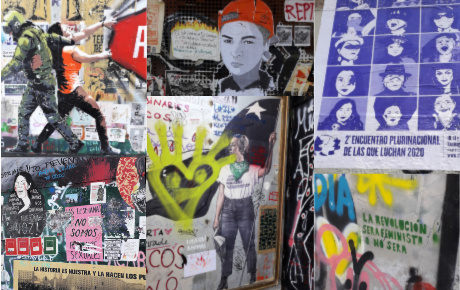
”We imagine peaceful, sustainable and highly democratic environments: at home, in our neighbourhoods and communities, at work and in public institutions.” Inta Rivas-Fauré on the power of the Chilean feminist movement in the urgent, massive manifestations against the authoritarian, neoliberal state.
Chilean feminists are a political force to consider. Now, more than ever, with massive feminist actions taking place around the country and in the region on an 8th of March 2020 in the context of ”Chile despertó” (Chile has woken up). The challenge was how to mobilize ”glocally” in order to reach our goals. As the popular chants say: ”To gain everything! Or else, for what?” and ”Chile might be the birthplace of the neoliberal state but will also be the place where it is buried.”.
This feminist struggle, in its fourth wave, has become radicalized and is part of the popular uprising that demands a new, people’s Constitution and the resignation of president Sebastián Piñera. Chile has a history of feminist thought, especially within the women’s workers-movement since the early 20th century, the Seamstresses union being one of the most famous.
Today, Chilean feminists constitute a legitimized power that has successfully managed to present solutions, particularly on the issues of sexual harassment and femicide, such as the implementation of stricter prevention protocols and complaint mechanisms and a law which extends femicide to all gender crimes. This is clearly because of the massive mobilizations that took strength in the midst of ”the feminist May of 2018”, when most universities and many secondary schools experienced occupations and strikes by students that demanded the end of sexual harassment and a more just and non-sexist education.
There was no doubt that the manifestations of the 8th of March2020 would be massive, just as the march in 2019, that then became the most numerous march in Chile since the return to democracy. This, of course, until the march of more than a million on the 25th of October 2019.
As feminists, we are now part of the urgent and massive manifestations due to a profound discontent with the authoritarian and extremely neoliberal regime of Sebastián Piñera. His government has been analyzed by international organizations, such as Human Rights Watch, Amnesty International, and the UN. They have all concluded that systematic violations of human rights committed by the State has been the most tragic: massive arrests of protesters including violence and sexual abuse, life-threatening injuries due to hits by police vehicles, eye mutilations of protesters by anti-disturbance weapons and deaths. Officially four committed by the State).
Despite the violence and the obvious fear it arouses, it seems the movement is stronger than ever, already making direct actions such as changing the names of statues of men and public spaces to the name of women who deserve to be remembered. The presence in the streets has to do with the need to be heard, in a context where most struggles and female voices are constantly marginalized in the public debate and in the mass media.
Meanwhile, Piñera’s government, with the support also of parliamentarians which are not part of the conservative alliance in power, continue to criminalize the street protests by elevating penalties against those who, for instance, engage in barricades. Something rather common for protesters as a self-defense mechanism due to the high risk for ”hit and run”-attacks by the militarized police and their violent methods.
The feminist struggle has to continue to be strategic and broad. In Chile it has a national coordination that yearly organizes the plurinational meetings for ”those who fight” (Encuentro Plurinacional de las que Luchan) with the participation of thousands of feminists from all over the region. The guiding principles for its work have to do with the advancement of gender equity and freedom to auto-determination, for instance, legal abortion and the end of patriarchal institutions, both at home, in society and at work, considering territorial needs and characteristics.
This local political work has to continue to be developed through creative methods (not necessarily the same of traditional political movements and with continuous plenaries), in order to integrate different causes and embrace the complexity of the problems. It is only through this struggle it will be possible to make radical societal change.
It is urgent we eradicate poverty and all other types of violence such as misogynistic and racist violence, and to secure our socio-ecological systems.
We are in a climate emergency where we must all reorganize, consider de-growth and adapt because it is intrinsically linked to our capacities to protect the rights that are already gained.
We imagine peaceful, sustainable and highly democratic environments: at home, in our neighbourhoods and communities, at work and in public institutions. That is, something completely different to capitalism, that has proven itself to be a depredatory model. There is much work to do and our political work will have to be combined with presence in the streets and in the glocal movements.






